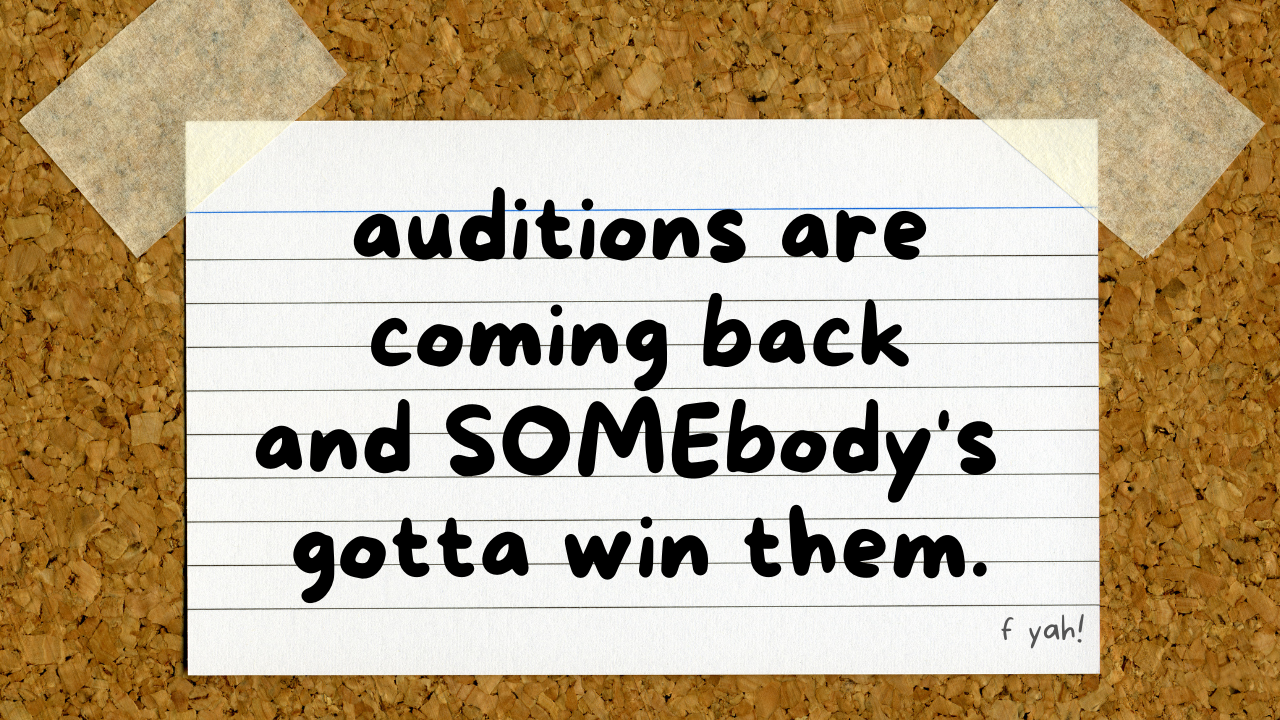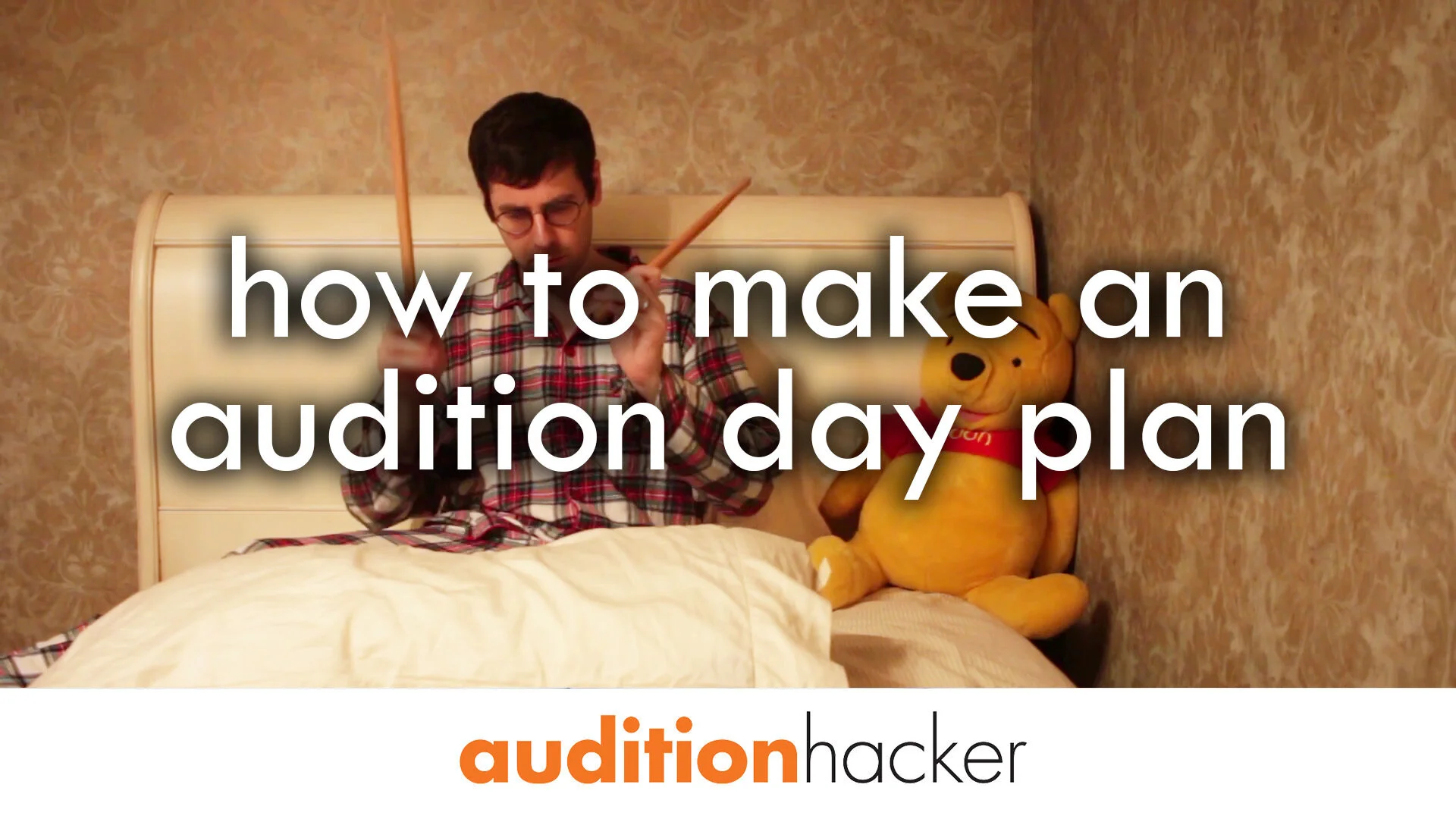here’s a question i get a lot: “am i too old to take an audition?”
to which i give my stock reply...“well, i have a friend in the met orchestra who won his job at the age of 54.” (it’s true. i’ll explain in a minute.)
i also get this question: “i’m really busy right now working a side job and practicing. can i really win an audition this way?”
or this one: “am i going to be good enough to win a job if i didn’t go to a conservatory?"
there’s an attitude problem going around lately.
and it goes like this:
people assume that you have to have an impeccable musical background and a supremely perfect practice situation to have a chance at winning an audition.
but if just one thing about your background is questionable (like you started at the age of 10 😵 instead of the age of 6), or if you feel like your current practice situation is not quite sparklingly perfect ("omg! i have 30 students each week! how am i supposed to practice?!"), then you assume you should just give up completely because you’ll never measure up to “the best."
basically, people think that the stars have to align for you to be competitive in an audition.
well.
if this describes you, i have some news for you.
there are people who felt just like you, who are now in big orchestras.
they’re in MY orchestra.
these are people who, at the time of their audition, had the same types of disadvantages that you’re facing. they might have even been older than you, busier than you, or had a less prestigious background than you.
the only difference was that they didn’t let that fact get in the way of them practicing to win. they persisted, they found solutions, and they eventually found success.
in my audition course, i teach that no matter where you are, you should make sure that you’re the hardest working person around. and that after a disappointing audition, you persevere by thinking through what you did right, what could be better, and making a plan for the next one. (we’ll be diving into a step-by-step system for doing that in the auditionhacker formula summer boot camp. and, by the way, enrollment for the course ends on sunday, april 23rd at 11:59pm eastern.)
so i asked three of my met colleagues who were each facing major disadvantages how they dealt with it.
want to nail your next audition?
here's the 5-part audition preparation method i used to win a job in the met orchestra.
(for any instrument!)
3 met musicians who overcame the odds to win a job
photo credit: matt dine
1. mark romatz won his contrabassoon position in the met orchestra at the age of 54.
and it wasn’t out of the blue.
he pretty much continuously moved up from orchestra to orchestra and his most recent audition win (at the met) was more than 30 years (!) after his first:
flint symphony, age 21
duluth symphony, age 23
savannah symphony, age 32
jacksonville symphony, age 35
montréal symphony, age 45
metropolitan opera orchestra, age 54
rob: so mark...what made you keep taking auditions instead of settling down?
mark: the first two jobs were very small, provided no benefits, and didn’t pay well, so i wanted a full-time job. after i got to savannah and then jacksonville, the competition drove me. i guess i felt i still had things to prove.
rob: did you ever want to stop and how did you push through?
mark: i wanted to quit all the time. i found myself needing to prove to myself and to my colleagues that i was better than the chair i was sitting in.
rob: any words of advice for young or not-so-young auditioners?
mark: i was told by a friend that if you really want something, if you persevere, you’ll get what you want. i guess she was right, and i always remembered those words.
2. julia bruskin won her cello position in the met orchestra while living the busy new york freelancing life and raising a 7 month old baby.
“it was a relatively short list of excerpts,” she says about the met audition list, considering the unbelievable amount of other stuff she was doing at the time:
photo credit: chris lee
performing and touring with her trio, the Claremont Trio,
learning and recording a nearly unplayable comtemporary cello work,
teaching at queens college
raising a 7 month-old baby
personally, i don’t think i could have done one of those things and felt like i had time for any of the others. but she did it all.
rob: how did you balance gigs and practicing while you were preparing?
julia: i just carved out whatever time i could, usually an hour or two after my son was asleep. having children has made me extremely efficient while practicing.
rob: did you feel like you were too busy to take this audition seriously?
julia: it definitely crossed my mind that if i’d done this audition right after school, i would have had exponentially more hours to devote to practicing. but i knew that wasn’t possible at this point so i just worked with what i had. i played the list of excepts for my husband the week before the audition and nearly pulled out because i didn’t feel ready. i’m glad i didn’t…
rob: how did you justify spending time away from your family to try for something that wasn’t assured?
julia: the idea of playing in the met sounded amazing to me. i didn’t think of myself as the kind of player who won orchestra auditions, but i think this actually helped me because i didn’t feel the stress of any kind of expectations.
rob: any words of advice for busy auditioners?
julia: in the audition room, i wasn’t thinking about the job. i was just enjoying playing the cello. instead of feeling rusty and out of shape, i felt like i could play the way i wanted to play again. if it’s possible for auditioners to immerse themselves in the music and the joy of playing rather than thinking about the consequences, that’s probably a good thing.
3. pete bond never went to conservatory and won a trumpet position in the met orchestra.
as he says, “i have a sordid past.”
he started with drum and bugle corps and after that, barely got into the music school at western illinois university. when he was done, he didn’t go to conservatory…he joined the circus. yep.
after that he was invited to be in the jazz program at georgia state university and also started studying seriously with the principal trumpet player in the atlanta symphony.
then, he just started practicing like a demon and freelancing. after 7 years he won principal in new mexico symphony and then after 5 years and 10 or so auditions later, he joined the met.
rob: did you feel like you had a disadvantage since you didn’t go to conservatory?
pete: i definitely had an inferiority complex regarding players from juilliard, curtis, northwestern, etc., and i assumed they must all be virtuosos. but my disadvantage was less than i believed at the time. in fact, the more i teach and hear conservatory players, the less impressed i am with the teaching at these institutions. some of these faculty members can play brilliantly, but may not be particularly good teachers.
you can become a good player nearly anywhere, though it helps to be surrounded by better musicians.
rob: how did you work so hard knowing you had this disadvantage, imagined or real?
pete: my drum and bugle corps background gave me a very strong work ethic and i’m pretty sure i practiced harder than my competitors. and why would i NOT work hard under these circumstances? was i to go back to the factory? teach HS band? (THAT'S work.)
rob: any words of advice for people who didn’t go to conservatory who are looking for some encouragement?
pete: if you want it, go get it. but be realistic about your level. record yourself and ask; “would I pay $ to hear that?” or, “would I want to sit next to that player for 20 years?” or, “do I sound as good as __________ of the ___________symphony?" if not, "WHY not? what's different? can I make the adjustments necessary to sound the way I want?”
so. do you see a trend here?
mark says you should perservere, julia found a way to practice efficiently, and pete says that if you want it, you should go and get it.
each felt a disadvantage and dealt with that advantage by practicing hard and practicing smart
these “disadvantages” are really just limiting beliefs.
if you think you’re too old to audition, then you won’t practice enough and you won’t do well.
my “disadvantage” was that i had debilitating nerves. i could have given up…but instead i worked on my audition prep anyway and believed that someday i’d figure it out. my audition preparation process includes methods that attack nerves every single step of the way, because that was my big struggle.
my question for you is…what’s your “disadvantage?”
how are you going to deal with it?
are you going to practice differently? are you going to reframe your thinking?
you can’t let these limiting beliefs stop you from auditioning.
that’s it. that’s all i wanted to say.
want to nail your next audition?
here's the 5-part audition preparation method i used to win a job in the met orchestra.
(for any instrument!)

















i've worked with hundreds of musicians on audition preparation. and nothing - NOTHING - has been as effective and life-changing as when they start self-recording the right way.